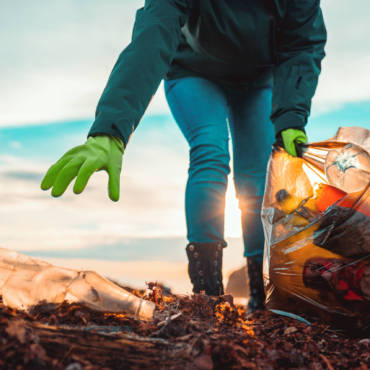Going Green for Earth Day

In a March 2020 survey by NAR, 70% of agents reported that promoting energy efficiency in a listing is “somewhat” or “very valuable”. In that same survey, 61% of respondents found that residential consumers were very or somewhat interested in sustainability.
On April 22, we will be celebrating the 51st annual Earth Day. Here are six actions you can take to keep the planet clean and healthy- and feel free to share with your clients!
Cleaning up Around the Neighborhood
Start Earth Day 2021 by going outside! Go for a walk around your neighborhood or local park with a trash bag and gloves and help clean up any plastic or other garbage you come across. This is a great activity for friends, couples, or families to partake in. You’ll start to realize how much plastic and general garbage is laying around in our communities. Make sure to separate the recyclables from the garbage. Some examples of recyclables are plastics (check labels, not all plastics are recyclable), glass, aluminum, metal, cardboard, and paper such as phonebooks, magazines, and newspapers. You can get some more tips on recycling and how to recycle better here.
Plant a Tree
Trees are so amazing for our environment – and planting a tree is a great way to celebrate Earth Day! When planting a tree, it does more than just beautify the area. Trees pull carbon dioxide out of the air, cool overheated places, benefits agriculture and animals, and boosts local economies. Trees help clean the air and help you breathe. They also can absorb odors and pollutants like nitrogen oxides, ammonia, sulfur dioxide, and ozone. Be sure to do your research and talk to your local government about planting more trees in public spaces or consider planting on your own property
Conserve Water When You Can
Simply put, we tend to waste a lot of water in our day-to-day lives. It can be difficult to gauge how much you’re really using until you put it into perspective. For example, according to the U.S Geological Survey, on average, each person uses 80-100 gallons of water per day for indoor use only. Avoid keeping the water running when you are doing activities such as washing your dishes, brushing your teeth, and taking a shower. Make sure there are no leaks in your home – and if there are, be sure to take care of it as soon as possible. Look out for leaky faucets, dripping water from shower heads or sinks, rusting pipes or any signs of water damage.
Swap Out Household Products for Greener Options
Something should be said about the products that we use on a regular basis that ends up touching the foods we eat as well as our skin. When looking for greener alternatives for your household supplies, they should be marked as non-toxic, biodegradable, and made from renewable resources (not petroleum). You can also DIY and make a home-mixed cleaner – vinegar and baking soda can be used to clean almost anything. Mix the vinegar and baking soda in a little warm water and you’ve got yourself an all-purpose cleaner.
Reduce, Reuse, and Recycle
Making the Earth a better place to live starts with you and your family. It’s a great opportunity to remind yourself, and maybe teach your children, the three R’s: Reduce, Reuse, and Recycle. The most effective way to reduce waste is not to create it in the first place. So, if you find yourself buying certain products over and over again, see if you are able to buy those products in bulk. If you can’t find certain products in bulk, look for options that use less packaging. When shopping for disposable items such as batteries, dog waste bags, toothbrushes, and paper products, look for reusable products over one-use disposables. Maintain and repair products such as clothing and appliances so they won’t have to be thrown out or replaced as frequently. If you can’t reuse or repurpose your existing items, consider donating them instead of throwing them out.
Eliminate Chemicals in the Yard and Garden
By properly taking care of our lawns and gardens, you can save money, time, and help save the environment. Store-bought fertilizers will definitely help your garden grow, but it may also contain harmful chemicals that can contaminate local water supplies and pollute the air. Go green by switching to composting! Composting is made from the remains of kitchen and yard waste – items such as coffee grounds, egg shells, vegetable peels, and grass clippings. Any kind of organic material can be added to your compost and used as a free source of fertilizer. Composting is a natural way to recycle your yard and kitchen waste that you would have otherwise thrown in the trash. If you have a problem with pests to the point where you feel needs a pesticide, be absolutely sure you need a pesticide before you use it. On-going pest problems are often a sign that the area is not getting what it needs to stay healthy. It’s important to identify the root of the issue first before turning straight to pesticides. To prevent garden and yard pests, maintain healthy soil with compost and mulch, select pest-resistant plants, pull weeds before they seed and spread, and remove dead plants to reduce hiding places for insect pests.




